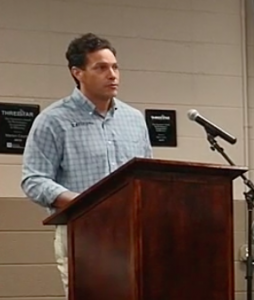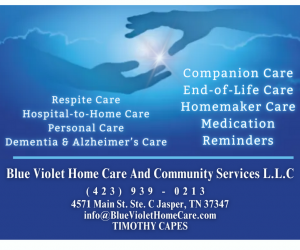
LACIE SILVA – Editor
At the August 28 Marion County Commissioner meeting, Jeff Cobbs presented a proposal for a statewide change aimed at requiring the transfer of control from Property Owners Associations (POA) to a Homeowners Association (HOA). Dane Bradshaw, President of Jasper Highlands, stood as the voice of opposition, representing both himself and the developer enterprises while also holding the title of President of Jasper POA.
Bradshaw followed Cobb’s request to the board and clarified the purpose of the HOA and the responsibilities of the people. He explained, “When people buy property in Jasper Highlands, or a gated community, or a homeowners association, they are willingly and knowingly buying property subject to the covenants and restrictions of that gated community. In our case they are buying land where their deed is subject to the rules and regulations that are run by the developer.” As he further expressed, this is the choice of the homebuyer and the responsibility of the homebuyer to abide by the set rules and regulations upon moving into the property they purchased of their own free will. Bradshaw also advised that people have the expressed ability to purchase land that is not restricted by an HOA should they so desire.
Homes within communities governed by HOAs or POAs typically grant residents access to various amenities as part of the yearly dues, the extent of which varies based on the specific community and its governing organization. These amenities serve as a part of the residents’ benefits and enhance their overall community experience. Bradshaw contested the assertion that the annual dues exist solely to generate profits for developers. He emphasized that these fees, totaling $984 per year for residents of the gated community, have a clear purpose. He elaborated that they are allocated towards enhancing community benefits and maintaining a reserve fund for addressing potentially expensive repairs within the community.
Bradshaw exemplified the range of amenities by saying, “You can wake up any morning and go to the pool at Jasper Park, you can walk the trails, you can use the fire pit and the pavilion, open area and the gazebo. Whatever you like.”
Bradshaw conveyed his appreciation to homeowners who diligently pay their dues, which enables developers to maintain the properties and community effectively. He underscored that among these expenses, road repairs and maintenance are the most costly and stressed the importance of the reserve fund allocated from a portion of these fees.
He described that developers have constructed more than 28 miles of paved roads within Jasper Highlands and highlighted the significant number of properties, totaling over 1,200, as a contributing factor in maintaining the yearly dues at a reasonable cost of $984. Bradshaw clarified that the POA has accumulated over $1 million in its operating account, and these funds do not go to individuals such as Bradshaw, John Thorton, or Clarence Highland. He also noted that administrative fees, charged to cover minimal accounting expenses, are approximately one-fifth of the market rate.
Furthermore, Bradshaw discussed the potential transfer of operations to an HOA and its implications. He indicated that in such a scenario, the HOA would still need to engage a third party to perform the same services currently undertaken by developers. Bradshaw cautioned that this transition could lead to a decrease in the reserve fund and possibly result in higher yearly dues, which he deemed financially irresponsible given the potential surplus in the reserve.
Bradshaw acknowledged that they do receive some revenue from the yearly fees, but he emphasized that the amount is relatively small, much less than what a third-party company would charge. He also disputed the notion that they have no intention of transferring control of the properties, explaining that they have invested a significant amount of effort, time, and money into building the community without generating substantial profits. According to Bradshaw, the combined value of the remaining properties exceeds $15 million.
He went on to explain that the developers are committed to enhancing the marketability of the remaining properties, underlining their ongoing support for the housing community.
Bradshaw also contested the assertion that Tennessee mandates developers to relinquish control when they reach 75% of a housing development sold. He clarified that such rules, where they exist, vary among states and are often at different capacity percentages. He assured the board that this policy does not imply the developers will never transfer control to the homeowners.
Additionally, he refuted the idea that the ownership of the developments was tied to the developers’ retirement plans, wills, trusts, or inheritances. Bradshaw emphasized that providing services and conducting meetings for the organization at no cost was not part of his or the developers’ retirement plans. He stressed that there is no financial exploitation, as suggested by Cobb.
Moreover, he expressed his viewpoint that demanding the developers to transfer control after selling nearly 75% of the available properties is anti-growth and anti-development principles. Bradshaw extended his appreciation to Jasper Highlands, specifically highlighting the 400 homes on the mountain that contribute to their community.
He also elaborated on the advisory board meetings, which are quarterly community feedback sessions. Bradshaw acknowledged that the individuals attending these meetings do not possess voting power but can bring forth ideas, issues, and feedback for consideration by the developers.
Bradshaw emphasized his belief that the proposal is unnecessary and would entail a change in state law. He pointed out that at the county level, the Commissioners Board would be advocating for this change with legislators. In making this argument, Bradshaw indicated that the legislation is not within the purview of the local board to decide, as it pertains to a statewide issue that falls under the jurisdiction of higher authorities.
The first part of this story covered the proposal issued by Cobbs and he emphasized that the issue was not specific to Jasper Highlands. Bradshaw acknowledged the issues but contextualized them through his position in direct relation to the gated community. This legislation, though not limited to Jasper Highlands, would ultimately affect the community. Next week will feature an exploration of concerns, statements, and narratives voiced by community members during the public comments section directly concerning significant issues in the Jasper Highlands gated community.
The Marion Tribune – September 21, 2023










